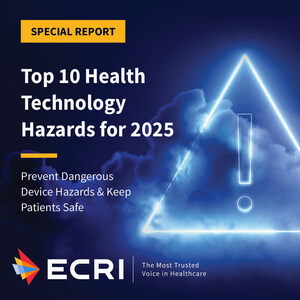White House dialogue on healthcare safety moderated by ECRI
Key insights and patient safety commitments follow D.C. summit
PLYMOUTH MEETING, Pa., Sept. 26, 2024 /PRNewswire/ -- The White House Office of Science and Technology Policy (OSTP) convened healthcare leaders and Biden-Harris Administration officials for a Healthcare Safety Forum on Sept. 17. The president and CEO of ECRI, a global healthcare quality and safety nonprofit, Marcus Schabacker, MD, PhD, moderated a panel at the White House to highlight successful practices that improve patient safety, workforce safety and wellbeing, and patient health. A recording of the event is now available online.
The White House convened the forum to elevate best practices in patient safety and catalyze public and private action to achieve a milestone 50 percent reduction in patient and workforce harm towards the goal of zero preventable harm. The Health Outcomes Division of OSTP called attendees' participation "critical to our collective work to improve healthcare safety, for both patients and the workforce."
Several ECRI leaders were among a select few organizations nationwide invited to participate in the summit to lead discussions on healthcare safety and innovation, including ECRI President and CEO Dr. Marcus Schabacker, Chief Medical Officer Dr. Dheerendra Kommala, Chief Solutions Officer Stuart Morris-Hipkins, Chief Strategy Officer Bevin O'Neil, and Executive Director of ECRI's Total Systems Safety Shannon Davila.
ECRI's Dialogue with Health System Leaders
Leaders from three top health systems joined the panel moderated by ECRI's president to discuss empowering the patient's voice, addressing unexpected harm events, leadership and governance, workforce safety, and making healthcare safer by design.
"For far too long, the healthcare industry has tried to address medical errors by attempting to isolate causes in silos," warned Schabacker, ECRI CEO. "That's the definition of insanity – trying over and over and achieving the same results. We simply won't make sustainable safety improvements without a systems-approach and radical transparency. Other high-risk industries like the military, aviation and nuclear power already embrace systems-thinking, but it's not consistently implemented across healthcare yet. As a result, we continue to see tragic rates of preventable harm in American healthcare facilities every day."
Panelists from Cincinnati Children's Hospital – Stephen Muething, MD (Senior Advisor of Strategic Partnerships and Advisory Services) and Pamela Wendel (Director of Family Relations) – shared how they systematically incorporate the feedback and input of patients, caregivers and family members.
MedStar Health leaders discussed human factors engineering and best practices in responding to adverse events, particularly by fostering a psychologically safe "just culture" for the workforce. Rollin J. "Terry" Fairbanks (Senior Vice President & Chief Quality and Safety Officer) and Andrea Geraci, RN, MedStar Health Clinical Lead Nurse Practitioner, served on the panel.
Leaders from Prisma Health closed out the session, sharing how they implemented systems-based clinical operating systems to improve patient safety and the quality of care – led by Jonathan Gleason, MD (Executive Vice President, Chief Clinical Officer) and Greta S. Harper, MD, MBA (Chief Medical Officer-Acute Care).
Safety Actions Announced by White House
Following the summit, the Biden-Harris Administration announced actions designed to address patient and workforce safety from the Agency for Healthcare Research and Quality, Centers for Disease Control and Prevention, CMS (the nation's largest payer of health services), Department of Defense, the Health Resources and Services Administration (HRSA), the Veterans Health Administration (VHA), and other leading health organizations.
For decades, ECRI has served numerous federal agencies, providing evidence-based patient safety strategies, data analytics in the healthcare supply chain, early alerts on faulty medical supplies, and expertise to improve the safety, quality and equity of care.
The White House encouraged healthcare organizations to connect with the National Action Alliance for Patient and Workforce Safety to "keep these critical conversations and forward momentum going." ECRI has long been a member of the National Steering Committee for Patient Safety and has led efforts to implement the National Action Plan to Advance Patient Safety in hospitals and other healthcare settings across the country.
Before the summit, OSTP called on healthcare organizations to make bold commitments to advance the recommendations made in the PCAST Report and the five aims of National Action Alliance. ECRI and its affiliate ISMP committed to reducing preventable harm by 50 percent over the next five years in partnership with its nationwide healthcare provider systems safety learning network.
"By implementing an evidence-based total systems approach to safety, utilizing clinically informed human factors engineering, data-driven insights and patient-reported concerns, we will establish a truly person-centered approach that reduces preventable harm and advances health equity," noted ECRI's commitment to the White House.
About ECRI
ECRI is an independent, nonprofit organization improving the safety, quality, and cost-effectiveness of care across all healthcare settings. With a focus on technology evaluation and safety, ECRI is trusted by healthcare leaders and agencies worldwide. ECRI is designated an Evidence-based Practice Center by the U.S. Agency for Healthcare Research and Quality. ECRI and the Institute for Safe Medication Practices PSO is a federally certified Patient Safety Organization as designated by the U.S. Department of Health and Human Services. In 2020, ECRI acquired ISMP to create one of the largest healthcare quality and safety institutions in the world. Visit www.ecri.org.
SOURCE ECRI

WANT YOUR COMPANY'S NEWS FEATURED ON PRNEWSWIRE.COM?
Newsrooms &
Influencers
Digital Media
Outlets
Journalists
Opted In





Share this article